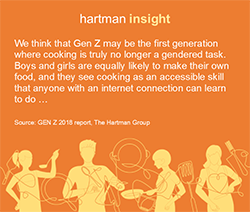Gen Z: A Developing Story, but Here’s What We Now Know
A big question on every marketer’s mind is which older generation Gen Z will be most like.
 With an upper age limit of 20 (as we’ve defined them in our recent research), Gen Z are still quite young and relatively inexperienced when it comes to shopping for themselves. They don’t yet have well-developed opinions and habits around shopping and brands, since they are still very much in a formative period in their lives. While many industry analysts and pundits have surmised that Gen Z will be an enhanced version of Millennials, our new Gen Z 2018 report finds that currently they look quite different from Millennials, who are looking for quality cues, transparency and sustainability credentials, simple ingredients, nutrient density, and new and exciting flavor experiences.
With an upper age limit of 20 (as we’ve defined them in our recent research), Gen Z are still quite young and relatively inexperienced when it comes to shopping for themselves. They don’t yet have well-developed opinions and habits around shopping and brands, since they are still very much in a formative period in their lives. While many industry analysts and pundits have surmised that Gen Z will be an enhanced version of Millennials, our new Gen Z 2018 report finds that currently they look quite different from Millennials, who are looking for quality cues, transparency and sustainability credentials, simple ingredients, nutrient density, and new and exciting flavor experiences.
At this early phase, if Gen Z resemble anyone, they currently look much like their Gen X parents, but we believe this is more a reflection of their lack of experience than of their own personal food values.
Here are a few highlights from our Gen Z 2018 report about what we now know about this up-and-coming, most influential generation of consumers.
Gen Z tend to have more progressive social values than older generations — and they’ve grown up within the wellness and foodie culture that Millennials have defined. We believe they will look much more like Millennials in their flavor preferences and purchasing habits as they get older and gain more responsibility for their own shopping and health.
All that said, they do seem to be a very practical and frugal generation. So how this combination of social values and frugality works out in store will be interesting to track! Our interviews and data suggest that Gen Z will be much more attribute-oriented than brand-oriented, for the following reasons:
- Except for a few iconic brands (what The Hartman Group calls “iconic brand experiences,” like Oreos or Doritos), they currently are quite brand-agnostic — store brands and name brands are equally appealing.
- They grew up with store brands like Simple Truth, Kirkland, Trader Joe’s, and 365 that devotees consider as good as, if not superior to, name brands. Being a store brand doesn’t automatically make something lower quality or less appealing.
- Gen Z are highly educated when it comes to diet and health. They learned in school how to read labels. They know to watch out for “chemicals,” to look for simple ingredients, and how to parse out nutrition facts. They believe organic food is better for you because it means no pesticides. They know that to evaluate quality and nutrition, they need to look past branding and packaging at these other factors.
 As to how different they’ll be from Millennials, we don’t think they’re going to be anything like a big, 180-degree shift but more like a strengthening or even full fruition of trends that we’ve seen among Millennials. Cooking is a good example. Over the long term (like the last couple of decades), we’ve seen cooking moving away from being something Mom did all by herself. There are lots of factors for this, but in the past few years, and especially as Millennials have come into their own as adults, this has meant a much more democratic and shared approach to cooking.
As to how different they’ll be from Millennials, we don’t think they’re going to be anything like a big, 180-degree shift but more like a strengthening or even full fruition of trends that we’ve seen among Millennials. Cooking is a good example. Over the long term (like the last couple of decades), we’ve seen cooking moving away from being something Mom did all by herself. There are lots of factors for this, but in the past few years, and especially as Millennials have come into their own as adults, this has meant a much more democratic and shared approach to cooking.
We think that Gen Z may be the first generation where cooking is truly no longer a gendered task. Boys and girls are equally likely to make their own food, and they see cooking as an accessible skill that anyone with an internet connection can learn to do, and indeed should learn, because it is healthier and less expensive than eating restaurant food all the time (again, frugal and practical). How they will deal with these tasks as they begin their own families is going to be interesting.
One thing that will likely be very different as Gen Z get older is where they shop. We expect a large migration online as they begin shopping for themselves. Many don’t understand why their parents don’t shop more online, and because they’re not very experienced shoppers themselves, they don’t share their parents’ fondness for picking out their own items — fresh or otherwise. Their phones are already their connection to the rest of the world. For them, grocery shopping online will seem not only convenient but the most natural thing in the world to do. That doesn’t mean they won’t go in person occasionally, but the drivers will certainly be different.
Their fondness for tech will also impact their restaurant habits, especially as delivery gets easier, cheaper, and faster (the delivery environment for restaurants is much more advanced than grocery currently, so this already happening). Easier delivery means that restaurants will be competing for what used to be at-home occasions that retail solved for with things like frozen meals. Gen Z's greater knowledge of H+W is also likely going to impact their restaurant choices and desires, much like it has for Millennials. In that way, they will likely be similar to Millennials in things like preferring fast casual to fast food, or ethnic food and local spots to bigger chains.
Gen Z really live on their phones, which means the way that they search for and consume information and inspiration is quite different from older generations (though not terribly different from Millennials). The sources that cater to their smartphone habits, such as snackable videos, app-based sources, and infotainment (all highly visual and social media-friendly), are the ones they’re going to use most often. In the report, we profiled Tasty (the BuzzFeed “channel”), which is really a model for providing what Gen Z want for food instruction and inspiration. We think that Tasty might just be Gen Z’s Joy of Cooking in that it’s teaching a generation how to cook.
About GEN Z 2018 Report
 The Hartman Group’s Gen Z 2018 report explores this generation’s values, attitudes, and approaches when it comes to food and beverages, eating and cooking, health and wellness, sources of information and inspiration, food retail, and restaurants. Gen Z 2018 focuses on Gen Z teens aged 12-20, with relevant comparisons to older generations: Millennials, Gen X, and Baby Boomers. The Hartman Group applies its signature combination of rich qualitative and robust quantitative methodologies to understand these emerging consumers and illuminate the opportunities and challenges they pose to the food and beverage industry. View report summary
The Hartman Group’s Gen Z 2018 report explores this generation’s values, attitudes, and approaches when it comes to food and beverages, eating and cooking, health and wellness, sources of information and inspiration, food retail, and restaurants. Gen Z 2018 focuses on Gen Z teens aged 12-20, with relevant comparisons to older generations: Millennials, Gen X, and Baby Boomers. The Hartman Group applies its signature combination of rich qualitative and robust quantitative methodologies to understand these emerging consumers and illuminate the opportunities and challenges they pose to the food and beverage industry. View report summary
